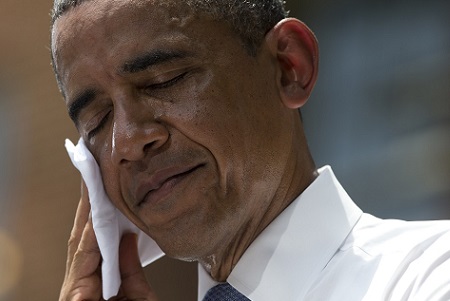-
 27Jun2013
27Jun2013 - Written by Dr. Karanja A. Ajanaku[1]
In Memphis and various cities throughout the nation, the Voting Rights Act battle has begun anew in the wake of an aggressive ruling by the U.S. Supreme Court on Tuesday.
In a narrow 5-4 decision, the High Court branded Section 4 of the Voting Rights Act unconstitutional, scrapping the formula used to determine which states and localities need preclearance before changing their voting laws.
Although Tennessee was not among the states required to seek preclearance, don’t expect Memphis-based Voting Rights Act supporters – such as the local branch of the NAACP – to sit out the fight to gain a replacement for what many label as the “most effective tool to prevent voter disenfranchisement.”
On Wednesday, Memphis Branch NAACP Executive Director Madeleine C. Taylor and members of the board sounded out their attention to scrap like heck “to ensure protection for voters in this democratic society.” They assembled in the branch’s conference room, in front of a backdrop of four local Voting Rights Act stalwarts – the late Jesse Turner Sr., Maxine Smith, Benjamin L. Hooks and Vasco Smith.
Tennessee’s history in voting rights did not bring the preclearance provision into play, said Taylor. She noted, however, that the state has been involved in making laws to restrict voting rights of citizens, as have 31-plus other states.
“(Section 4) represented the regulatory teeth which enabled restrictive measures to be blocked in 14 states by veto, referendums, court decisions or the Department of Justice in the last two years alone,” said Taylor. “This year 11 courts blocked restrictive voting laws. Most of these dealt with voter suppression through photo identification, felony disenfranchisement, and proof of citizenship laws.”
Though disappointing, the Supreme Court’s ruling was not a surprise said Taylor.
“In the current environment with the conservative bent of the Court, we had to sort of expect it,” said Taylor. “However, since 1965 when the Voting Rights Act was written, Congress has supported it. It has been reauthorized on at least three occasions. We have to put our faith in Congress to continue to support the Voting Rights Act.”
Still, some say the act is outdated and has been extended beyond its original intent. Van Turner, the Memphis Branch’s legal redress chairman, pointed to the passage of voter ID legislation in Tennessee as a counter to that argument.
“I think there are still challenges as it relates to voting,” said Turner. “These issues have improved but they have not gone away, and this is why the ’65 Voting Rights Act is important in full. Each section was important…
“We think it really was just a poor decision…Hopefully Congress will come up with a formula to allow for preclearance,” he said. “The preclearance allowed us to address issues before they became issues.”
While much concern was voiced about the possible effect of voter ID laws, African Americans still voted in hefty numbers in the last presidential election. So, is there reason to think a similar response will follow in light of the Supreme Court’s Voting Rights Act gutting?
“In Memphis and Shelby County a lot of folks were excited about the president’s election,” said Turner. “But that’s the last time we will see him on the ballot. And there are other elections besides presidential elections where voters are affected. Presidential elections normally generate large turnouts, but in smaller elections where there are gubernatorial elections, where there are local elections, you want have that turnout and you will still have those issues.”
It’s necessary to look at each election, he said. “Those issues will be even more important in smaller elections when everyone is not watching.”
Taylor pointed to rules locally and statewide where districts are being gerrymandered and where polling places are being changed or merged. “Those are small changes that make a big impact on voter turnout,” she said.
The NAACP national website features a petition asking people to sign up and to urge Congressional representatives throughout their states to support coming together to craft a legislative plan to replace Section 4.
Meanwhile, President Barack Obama has pledged that his administration will do “everything in its power” to repair the damage done by the Supreme Court’s ruling on Section 4.
Calling the decision a setback, President Obama said, “(It) doesn’t represent the end of our efforts to end voting discrimination. I am calling on Congress to pass legislation to ensure every American has equal access to the polls.”
References
- ^Dr. Karanja A. Ajanaku (www.tsdmemphis.com)